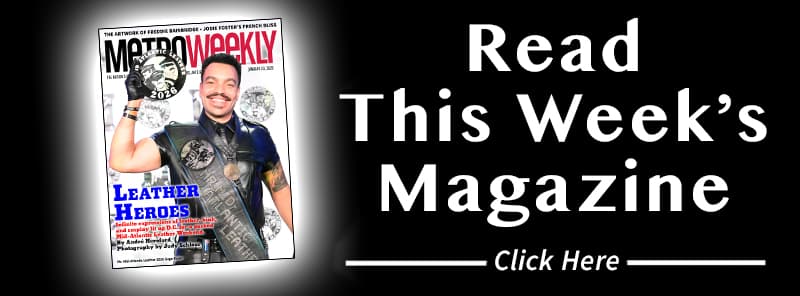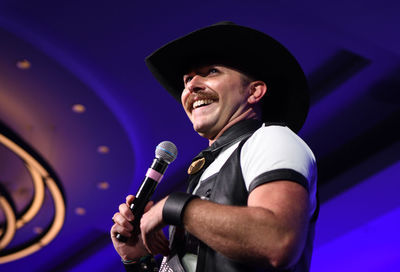The Long Walk Review: Stephen King’s Dystopian Horror Stumbles
Well-acted by its cast of young stars, The Long Walk trudges through a monotonous march of dystopian violence.

Even by the unhinged standards of Stephen King’s wicked imagination, the United States of America envisioned in The Long Walk is one fucked up country. And yet, an American society that makes a contest of sacrificing its sons to gun violence, ostensibly for the sake of the republic, doesn’t fall far outside the realm of future possibilities.
King published the novel in 1979, under the pseudonym Richard Bachman, when enlisting contenders from each state into a deadly marathon of endurance, forcing them to keep up the pace or be shot to death by soldiers, must have read as an outlandishly grim metaphor for sending boys to war.
In the film adaptation, directed by Francis Lawrence and scripted by JT Mollner, the war metaphor still resonates loud and clear, now joined by the modern-day specters of school shootings and radicalized young men in crisis. Totalitarianism in America no longer seems an outlandish stretch, and neither, unfortunately, does the “Long Walk” as a federal government-sanctioned competition.
Current events have caught up with King’s cracked future, supplying a palpable undercurrent of real-world tension to the sight of soldiers in tanks and Humvees marching brave but frightened teens down this doomed road.
On the other hand, pop culture has become so saturated with YA dystopia fiction like The Hunger Games — Lawrence has directed four films (and counting) in that franchise — that King’s once-disturbing horror premise now plays as a no-frills variation on a common theme (that he practically invented).

Picking off pledges in a brutal tyrannical contest is just another form of slasher flick at this point, and Lawrence doesn’t elevate the form here except with the casting.
Licorice Pizza breakout Cooper Hoffman and Alien: Romulus standout David Jonsson are riveting as Garrity and McVries, also known by their contestant numbers, #47 and #23. Portraying a philosophical young man grieving the death of a father he idolized, Hoffman, exuding smarts and compassion, centers the uniformly solid ensemble.
Beyond Garrity and McVries, the film’s core group of guys is granted more or less one key personality trait apiece, but the actors, abetted by detailed wardrobe and styling, make those one-note characters vivid. Certainly everyone onscreen looks convincingly scared to death of being sprayed with bullets by soldiers herding them along their trail of tears.
The camera never flinches from the terrible sight of boys who fall behind the pace being torn apart by gunfire, their blood and other fluids splattered across the road. Mile after grisly mile, the boys walk and walk, and bond and bicker the way lads do, while one by one, they’re executed by rifle.
Across 300-plus miles, the cycle grows monotonous, a condition only exacerbated by the movie’s dull palette of grays and beiges, and unvarying expanses of pavement. The walkers trudge forward through pouring rain and blazing heat, and the road everywhere looks mostly the same.
There’s not much world-building at all off the road. Flashbacks revealing Garrity’s family background help illuminate the extent of the government’s totalitarian control. But meaningful details about the “Big War” that led to this horrible regime, or who’s behind it, are scarce.
All we’ve got is the “Long Walk,” and kids being mowed down ruthlessly, again and again, for the scantest reasons. This unpleasant contest offers comfort only for the winner, and definitely not for the viewer.
Anyone can win, though, according to The Major, the enigmatic military leader in command of the contest. Played with sinister glee by Mark Hamill, The Major is at least a little bit funny, which is one thing other than blood and guts to break up the monotony along this long and winding road.
The Long Walk (★★☆☆☆) is Rated R and opens nationwide on Sept. 12. Visit www.fandango.com.
Support Metro Weekly’s Journalism
These are challenging times for news organizations. And yet it’s crucial we stay active and provide vital resources and information to both our local readers and the world. So won’t you please take a moment and consider supporting Metro Weekly with a membership? For as little as $5 a month, you can help ensure Metro Weekly magazine and MetroWeekly.com remain free, viable resources as we provide the best, most diverse, culturally-resonant LGBTQ coverage in both the D.C. region and around the world. Memberships come with exclusive perks and discounts, your own personal digital delivery of each week’s magazine (and an archive), access to our Member's Lounge when it launches this fall, and exclusive members-only items like Metro Weekly Membership Mugs and Tote Bags! Check out all our membership levels here and please join us today!


























You must be logged in to post a comment.